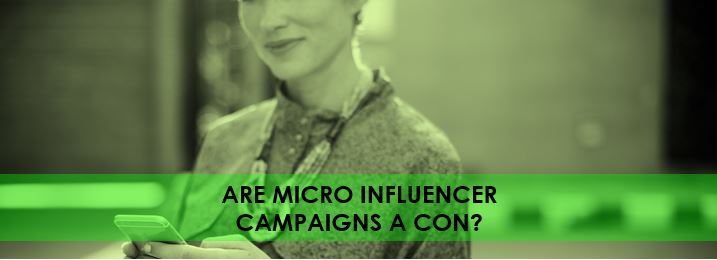Are Micro influencer campaigns a con?
August 20 2017
HAVE WE BEEN DUPED BY THE WORLD OF THE MICRO-INFLUENCER?
By Dudley Nevill-Spencer - The Influencer Angecy
There has been a lot of negative talk about micro-Influencer campaigns recently, some have even gone so far to say say they are a "scam" and, in some contexts, I couldn't agree more. How can I say that, well it's related to the automation of the industry and the way that some Micro-Influencer platforms are used and the methods some of the Influencers on those platforms use to boost their followers.
When I first started specialising in Influencer marketing - back in 08 – we saw our primary role to be that of connecting brands to all kinds of people - those on Social Media (MySpace at the time) as well as gatekeepers to celebrities, inner circles, key people in trade and business etc. Our belief was that if these people became genuine brand fans of a product, they would talk about it and INFLUENCE the consumer. They were the tastemakers - we called this "Influencer Marketing".
Influencer marketing is now considered to be purely about social media only Influencers (although I think this will change). I still work across all the categories mentioned above and feel that for a truly influential campaign you need to hit all those key Influencer segments - but I digress.
The reason we started our Influencer consultancy, was because we believed that paid-for advertising was starting to lose its effectiveness, particularly among young consumers, and that earned media (mentions, shares, reposts, comments, WOM ), built on a genuine connection between brands and Influencers was going to grow in importance. The truth is we were probably a few years ahead of the curve, but the power and value in creating those genuine links was indisputable.
We now however have a large section of the Influencer industry that works in the complete opposite way. Through automated systems and platforms a brand says what kind of a post they want, how much money they will pay and the scale of followers, the Influencer registers interest, the brand signs-off the deal and the campaign is executed. This kind of non-personal, "partner unknown" execution is not what Influencer marketing started out as, and in reality it is a form of ADVERTISING, or MEDIA BUYING more accurately.
And it has its place - if done properly - and it's a way getting scale and executing multiple campaigns quickly But it's not as powerful as "organic" influencer marketing and it has risks. It also lacks authenticity and can lack relevance - and therefore effectiveness - with the customer. Brands are not encouraged to check the values of the Influencer, to see if they actually resonate with the brand or the customers, to research them. It's easy to be blinded by the volume of followers, the filters for age, interests and location, but brands live and die by communicating consistent messages about what values they represent - " luxury", "craft", "family values", etc. The comments, subject matter, life the Influencer lives and the friends they have (not just the followers) determine the way Influencers are perceived by their audience, and not enough attention is paid to this. There is also the issue of fake followers, bots and made-up posts, and there have been a slew of "fake Instagrammers" and fake posts - where brands have been caught out working with the wrong Influencer. This can affect a brands positioning, reputation and sales. Have a look at this post, the manufactured imagery has created some pretty awful comments from some of the followers. https://www.instagram.com/p/BStdokIDPTa/
I have been championing Micro- Influencers for years, mainly because their engagement and response is so good, and if they are very small - 1000 - 5000, followers, they tend to have an incredible effect on sales for the clients we work with.
Ten Influencers of 2500 followers each will blitz the sales and enagement of one 100k influencer - every time.
Im not at liberty to reveal exact brands and data but I have had results from working with influencers at that kind of micro level that have seen 300% increases in sales online in Global brands per country. Basically the bigger the Influencer, the lower the engagement and the lower the effect on sales for the brand. Large Influencers are good for distribution and awareness, but the sales response is more effective with micro-influencer campaigns.
We call these super low volume Influencers "Local Heroes" - they are the Captain of the local football team, the cool gym instructor etc - they have a "circle of influence" that is legitimate - and they don’t get many offers from brands - so when they promote something, their followers listen, engage and act.
So how do you make sure your not taken for a ride in the Micro / Local Hero world - and how do you find them? Well that’s the subject of another post - I will delve into that later.
Dudley Nevill-Spencer

